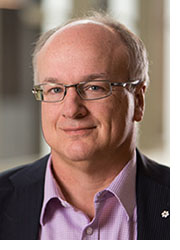
For more than two decades, Kent Roach, a professor at the University of Toronto Faculty of Law, has been teaching a course on wrongful convictions.
“Students are asked, what are the facts of the case? It’s important that we problematize this idea that the facts are the facts,” says Roach, who’s forthcoming book – Wrongfully Convicted: Guilty Pleas, Imagined Crimes, and What Canada Must Do to Safeguard Justice (Simon & Schuster 2023) – bookends a trilogy on Canada’s criminal justice system with previously published books on Canadian policing and the Gerald Stanley and Colten Boushie cases.
“Wrongful convictions are largely the result of factual errors: Mistaken eyewitness identification, people lying, expert witnesses basing their testimony on their interpretation of the facts and their opinion,” says Roach.
Roach documented the criminal justice system’s failings as research director of the Goudge Inquiry into Pediatric Forensic Pathology in Ontario (2007-2008), discrediting pathologist Charles Smith who gave misleading forensic evidence in several criminal investigations.
More recently, Roach led research for A Miscarriages of Justice Commission, a report filed in November 2021 that advocated for the creation of an independent federal commission to consider cases of wrongful conviction.
 Today, Roach and alumni, Amanda Carling (JD 2012), Jessie Stirling (JD 2020), Joel Voss (JD 2020), and Sarah Harland-Logan (JD 2014) launch The Canadian Registry of Wrongful Convictions. Initiated in 2018, the Registry has been developed with the dedicated support of multiple U of T Law student researchers and several William Southam Journalism Fellows from U of T’s Massey College.
Today, Roach and alumni, Amanda Carling (JD 2012), Jessie Stirling (JD 2020), Joel Voss (JD 2020), and Sarah Harland-Logan (JD 2014) launch The Canadian Registry of Wrongful Convictions. Initiated in 2018, the Registry has been developed with the dedicated support of multiple U of T Law student researchers and several William Southam Journalism Fellows from U of T’s Massey College.
The Registry includes 83 publicly documented cases where a criminal conviction was overturned based on new matters of significance related to guilt not considered when the accused was convicted or pled guilty. The researchers do not have access to confidential information, do not make determinations of guilt or innocence, nor do they act on behalf of the wrongfully convicted.
“At the same time, the wrongful convictions recorded in the Registry are underinclusive of all miscarriages of criminal justice because of the difficulty people experience, once they have been convicted, in finding new evidence and having the courts accept it,” says Roach.
Roach has produced the Registry’s first report, Canada Has a Guilty Plea Wrongful Conviction Problem, which highlights some of the Registry’s key findings. He says most criminal convictions are the result of guilty pleas.
“We weren’t surprised that 18% of the cases that met our definition were the result of false guilty pleas. What was surprising, however, was that almost all the people who pled falsely were Indigenous, racialized, female or living with a disability.”
The bulk of where miscarriages of justice happen is when vulnerable people, who don't have good legal representation, plead guilty to get it over with, adds Carling, a Métis lawyer, and the Chief Executive Officer of the BC First Nations Justice Council.
Carling first joined Roach in co-teaching the wrongful convictions course at U of T Law, after working at Innocence Canada for three years.
“I did a lot of public legal education, primarily in First Nations, about the causes of wrongful convictions. As a new lawyer, I wanted to share the little that I knew, to try to prevent miscarriages of justice,” she says. “I had seen firsthand how difficult it is to overturn a wrongful conviction, and how few resources there are in Canada to support victims of miscarriages of justice.”
“But when I did those presentations, when I talked about the leading causes of wrongful convictions, I used the statistics from the U.S. Registry; we didn’t have Canadian data.”
“Indigenous and racialized people are overrepresented among the wrongfully convicted. That much is clear when you look at the Registry’s data visualizations,” says Stirling, who is a primary contributor to the Registry.
Stirling, who received the U of T President’s Award for Outstanding Indigenous Student of the Year in 2020, is a Kwakwaka’wakw woman and a member of the Wei Wai Kum First Nation located on Vancouver Island. Her work on the Registry began in 2018 as a Gerald W. Schwartz research fellow at U of T Law, working with Roach and Carling. She has continued to support the project since 2018 pro bono.
“As a research fellow, I worked to compile our master list of cases and refine our research parametres. I also researched and wrote on Indigenous wrongful convictions, and since 2018, I have been responsible for managing the project,” says Stirling, who is now an associate at Olthius Kleer Townshend LLP, a leading Aboriginal law firm in Canada.
Voss, who works in securities compliance, started volunteering with the project in 2020 with a focus on data analysis, research, data entry, and website development for the Registry.
“From our current dataset, approximately one-third of the wrongful convictions stem from an instance in which no crime occurred,” says Voss.
“To me, this is staggering. Many of those cases involved a loved one passing away. Invariably, the wrongfully convicted person lost a loved one, and then on top of that had to suffer through a justice system that got it wrong. This is a problem in Canada, and we need to do some work to uncover the full extent of this problem.”
Part of uncovering the truth requires coming to terms with the reality of Canada’s colonial history, which Carling says is starting to get unpacked.
The Registry includes a timeline of miscarriages of justice, dating back to 1755, when 8,000 Acadians were expelled from Nova Scotia over doubts of loyalty to the British Crown.
“The first step to unpacking Canada’s colonial legacy is educating people. Our timeline and the cases that are included in the Registry are just the beginning of the story that the Canadian criminal justice system has, and continues to, get it wrong,” says Carling.
Stirling adds that the Registry team expects to learn of new cases of wrongful conviction that meet their definition, following today’s launch. The Registry team can be contacted about cases they may have missed, or about incorrect or missing case information through the contact us form on the Registry’s website.
Since only publicly available information was used, including media sources, the possibilities for further research – going deeper into the existing cases and also adding new cases, are endless, notes the team.
“We have a list of things that we would have added if we had more time and resources,” says Carling. “For instance, we would like to look at wrongful convictions that happened under racist laws like the Indian Act provisions that banned the potlatch.”
A lot of their work is barely scratching the surface, she adds, noting their working group will continue, but as Canadian lawmakers start to debate the legislation that will create Canada’s first Miscarriage of Justice Review Commission, the need for data on lesser-known cases, as well as information about cases that haven’t yet received a remedy for their wrongful conviction, becomes that much more important.
“We hope that others will take up this work and freely share their findings so that the colonial justice system can work better for everyone.”
Roach adds that if the true perpetrator of a crime has never been caught, it’s another failure of the system.
“But it's an even more immediate failure of the state, when the state convicts and imprisons a person who is not guilty.”
The Canadian Registry of Wrongful Convictions was funded in part by a grant from the Bennett Family Foundation (Toronto).


 Today, Roach and alumni, Amanda Carling (JD 2012), Jessie Stirling (JD 2020), Joel Voss (JD 2020), and Sarah Harland-Logan (JD 2014) launch
Today, Roach and alumni, Amanda Carling (JD 2012), Jessie Stirling (JD 2020), Joel Voss (JD 2020), and Sarah Harland-Logan (JD 2014) launch